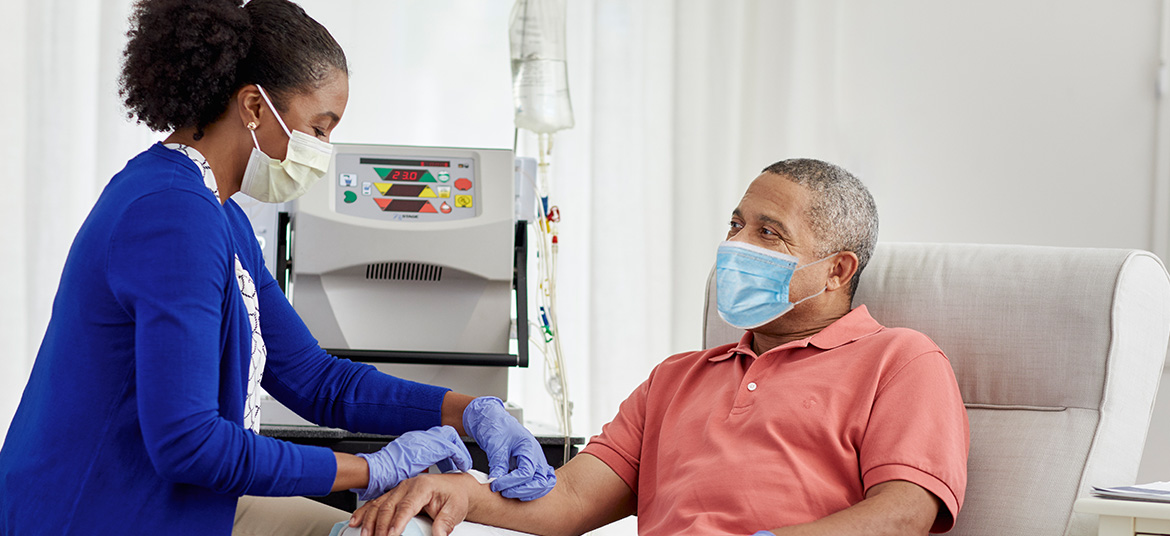
Patients and Nurses Say Transitional Care Units Educate, Empower, and Encourage
In fall 2020, dialysis center Clinical Manager Sara Militello, RN, attended a symposium to learn more about home dialysis therapies. While there, she joined a discussion about a program — and place — called the Transitional Care Unit (TCU). As Militello learned, TCUs are dedicated areas of dialysis centers where people new to dialysis (or those shifting to a new modality) can receive education, resources, and support from a small, dedicated care team.
A Good Place to Start
The TCU aims to help give patients a smoother start to dialysis and provide them the tools to pursue a therapy option that best fits their lifestyle — whether peritoneal dialysis (PD), home hemodialysis (home HD), in-center hemodialysis (HD), or pursuing placement on a transplant waiting list.
“It was the first time I really understood the potential of the program,” Militello recalls. “I thought to myself, ‘If I ever had to be on dialysis, this is a better way to start.’”
Militello’s workplace — Fresenius Kidney Care Essex County in Saugus, Massachusetts — had just been renovated, and a space with six new dialysis stations seemed like the perfect place for a TCU. She discussed the idea with her director and regional vice president, and within months Saugus was home to the first TCU in New England. Since then, this patient-focused model has become one of Militello’s passions as she’s seen dozens of patients experience its benefits.
“Starting dialysis is a huge thing for a person,” says Militello. “People go from just living their life to the reality of having to be on a machine three times a week, and that’s a huge loss of control. We find that starting in the TCU is better for them, both emotionally and physically.”
Dialysis Education, Structure, and Support
People with end stage renal disease (ESRD) are often overwhelmed by changes to their health, and the new terminology, technology, and decisions related to their care. It’s vital that they receive comprehensive education and support during this time. TCU participants see the same care team members for three to five weeks. The team is specific to the TCU, so patients have time to connect, ask questions, and discuss concerns. Topics covered include dialysis machines, cannulation, sterilization practices, diet, medications, and home dialysis options.
“The TCU process gives patients the ability to settle in and build trust [with care team members] because they have someone who can spend that time with them,” Militello observes.
Kelly Ann Manuel, a former in-center patient, was encouraged to consider home HD by her nurses at Fresenius Kidney Care Essex County. At first, Manuel was concerned about managing her therapy and equipment at home. The TCU allowed her to learn about home HD before committing to a home training program.
“My TCU care team showed me how to do everything, step by step,” recalls Manuel. “They taught me at my own pace so I wouldn’t be overwhelmed. When I left the TCU, I knew a lot about the machine and my home training nurse didn’t have to teach me all over again. I had confidence and peace of mind.”
More Frequent Therapy, More Energy, More Choices
Militello has also seen patients benefit physically from the TCU program — something she associates with more frequent HD.1 With a prescription from their physician, patients can try home HD during their time in the TCU. More frequent HD is usually administered daily for an average of about 2.5 hours per session. It gives people an idea of what it is like to dialyze daily. TCU patients often report feeling better on more frequent HD, and many choose to train for home HD.
“For people who haven’t seen or dialyzed on the home HD machines, the TCU gives them experience and shows them they can feel better,” says Molly Balogh, RN, a home therapies nurse at Fresenius Kidney Care in Ashtabula, Ohio.
Balogh remembers a patient named Mark Hibbitt, who was interested in home HD for the scheduling flexibility it offers and because he wanted more energy for his job as a handyman. Hibbitt started training with Balogh after some time in the TCU, where he learned about — and tried — more frequent HD for himself.
“When he came to us, he was already feeling better and was able to function better overall,” Balogh says. “That made for a more successful training experience for Mark. It was very important for him to feel well enough to keep working and have the scheduling freedom to keep up with his work.”
As a home HD patient, Manuel says she noticed an almost immediate difference in her energy after trying more frequent HD in the TCU. Less frequent dialysis treatments left her tired. “After more frequent therapy, I could do the dishes, attend my son’s baseball games, or do yard work. I hadn’t felt like that in years.”
One of the most notable advantages of the TCU, says Militello, is how the program empowers patients like Manuel and Hibbitt to choose the treatment that works best for them. Fresenius Kidney Care has seen between 40 and 50 percent of patients who start in the TCU choose a home modality.2
“When you can show patients their options early on, they are more confident in themselves,” Militello says. “Given a choice of treatments, I think most people would choose home. But even for those who don’t, the TCU gives them a great start.”



